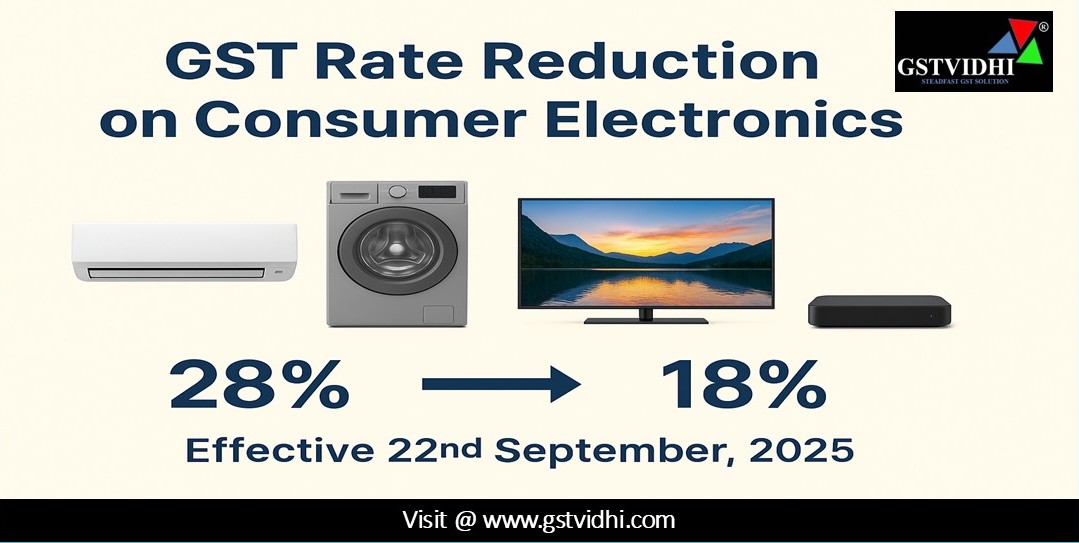
New GST Rate On Air Conditioning Machines, Dish Washing
Machines, Television Sets / New GST Rate on Consumer Electronics – Key
Highlights from the 56th GST Council Meeting
The 56th meeting of
the GST Council, held on 3rd September 2025 at Sushma Swaraj
Bhavan, New Delhi under the chairpersonship of Union Finance &
Corporate Affairs Minister Smt. Nirmala Sitharaman, brought much-needed
relief to consumers and industry stakeholders alike.
One of the most
significant announcements was the reduction of GST rates on consumer
electronics from 28% to 18%, effective 22nd September 2025.
This move is aimed at
benefiting the common man, aspirational middle class, and trade &
industry, making essential home appliances and electronics more affordable.
Goods
Covered Under the Rate Reduction
The following categories
of consumer electronics will now attract 18% GST instead of 28%:
|
S.
No.
|
Chapter
/ Heading / Tariff Item
|
Description
of Goods
|
|
1
|
8415
|
Air-conditioning
machines, comprising a motor-driven fan and elements for
changing temperature and humidity, including those where humidity cannot be
separately regulated
|
|
2
|
8422
|
Dish
washing machines – household [8422 11 00] and other
[8422 19 00]
|
|
3
|
8528
|
Television
sets (including LCD/LED TVs); monitors and
projectors not incorporating TV reception apparatus; reception apparatus for
television (with/without radio, sound, or video recording); set-top boxes
|
Impact of
the GST Rate Reduction
1. Cheaper
Consumer Durables – The reduction from 28% to 18%
will directly lower the prices of air-conditioners, dishwashers, and television
sets.
2. Boost
to Middle-Class Consumption – Electronics like ACs and TVs are
aspirational products for the growing middle class, and reduced tax burden will
encourage higher demand.
3. Industry
Relief – The consumer durables sector has long requested
rationalization of GST rates, and this decision is expected to stimulate sales
and inventory turnover.
4. Support
to Trade – Lower compliance burden and increased affordability
will drive growth in both urban and semi-urban markets.
Frequently
Asked Questions (FAQs)
To address potential
doubts, the GST Council has also issued clarifications. Below are some key
queries:
1. When will the new GST
rates apply?
- The revised rates will be effective from
22nd September 2025.
2. Which notification
will give effect to the revised rates?
- The changes will be notified through
the Official Gazette notifications under the CGST, SGST/UTGST, and
IGST Acts.
- Notifications will also be published
on the CBIC website.
3. What happens if supply
was made before the change but invoice issued later?
- As per Section 14(a)(i), CGST Act
2017:
- If payment is received after the
rate change → time of supply = earlier of payment date or invoice
date.
- If payment was received before
the rate change → time of supply = date of payment.
4. What if advances were
received but supply/invoice is pending?
- The applicable GST rate will be
determined as per time of supply provisions under Section 14.
5. What happens to ITC on
purchases made before the change?
- As per Section 16(1), CGST Act
2017, ITC is available for the tax charged at the prevailing rate at
the time of supply.
- Subsequent rate reductions do not
affect the entitlement to ITC, provided conditions under Section 49
are met.
6. Can I use ITC accrued
at higher rates for outward supplies now taxed at lower rates?
- Yes. Once ITC is duly credited in the
electronic credit ledger, it can be used to pay any output tax
liability as per Section 49(4), CGST Act 2017, irrespective of
later changes in GST rates.
Conclusion
The reduction of GST
rates on consumer electronics from 28% to 18% marks a significant
pro-consumer and pro-industry reform by the GST Council. By making essential
and aspirational home appliances more affordable, the decision is expected to boost
household consumption, support the manufacturing sector, and increase market
penetration of durable goods.
The accompanying FAQs
provide necessary clarity to ensure smooth transition and compliance for
taxpayers and businesses.
This rationalization of
rates demonstrates the Council’s continued efforts to balance revenue
interests with consumer welfare while fostering ease of doing business.
Disclaimer: All the Information is based on the notification, circular advisory and order issued by the Govt. authority and judgement delivered by the court or the authority information is strictly for educational purposes and on the basis of our best understanding of laws & not binding on anyone.
Press On Click Here To Download Order File
Click here